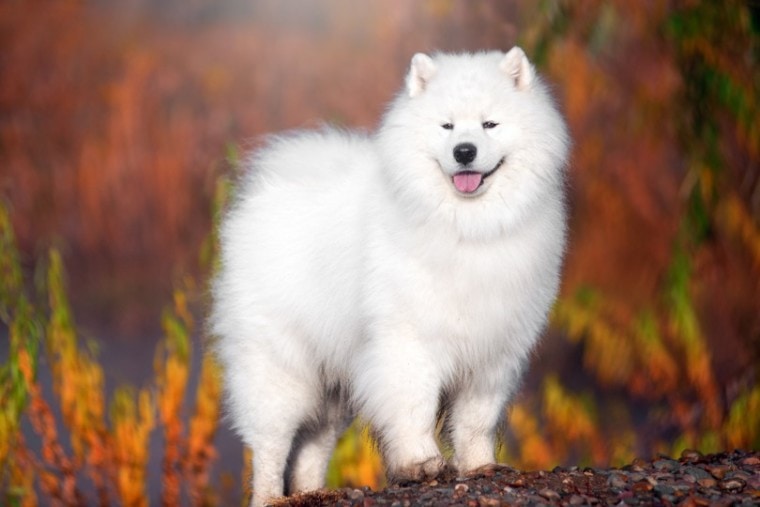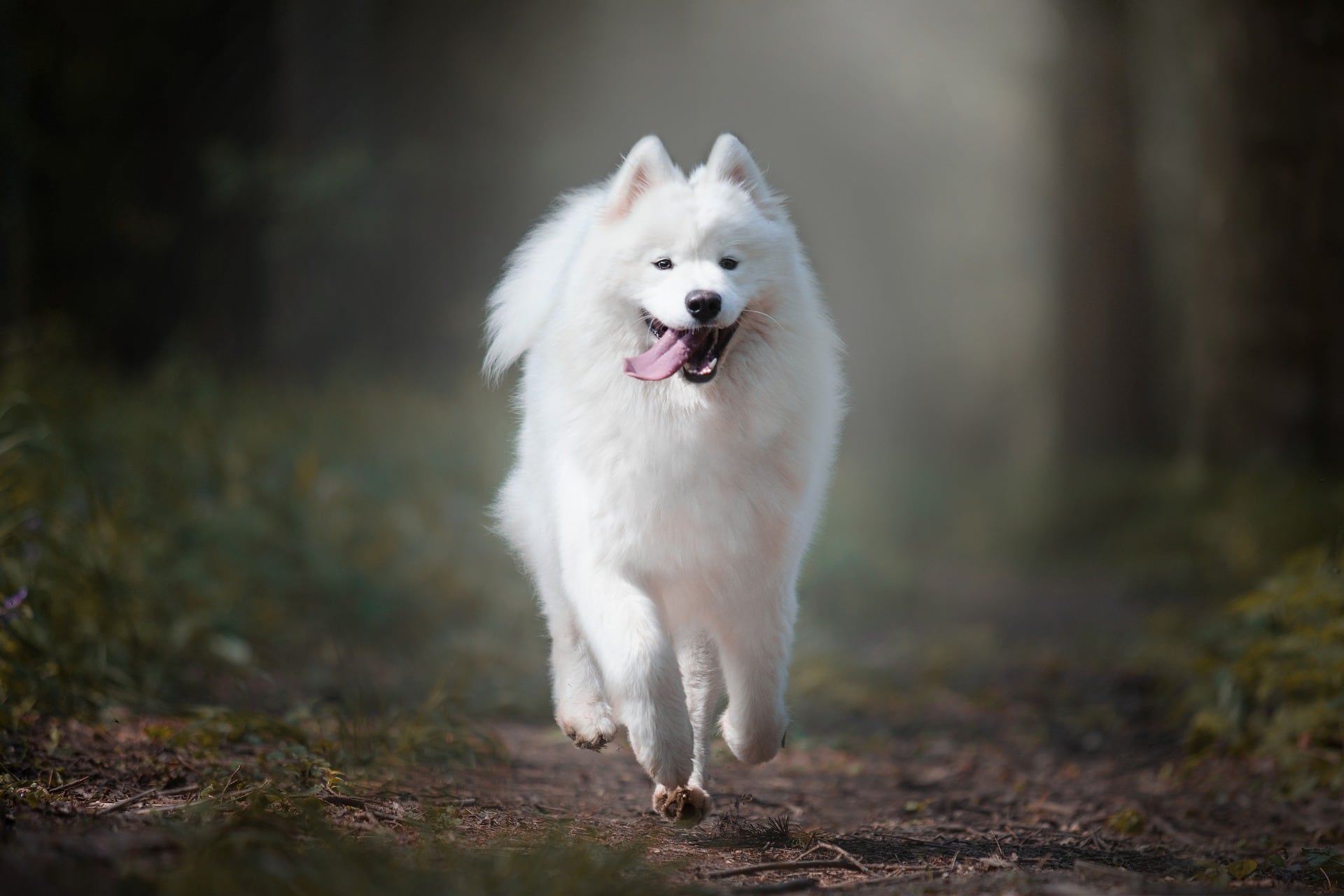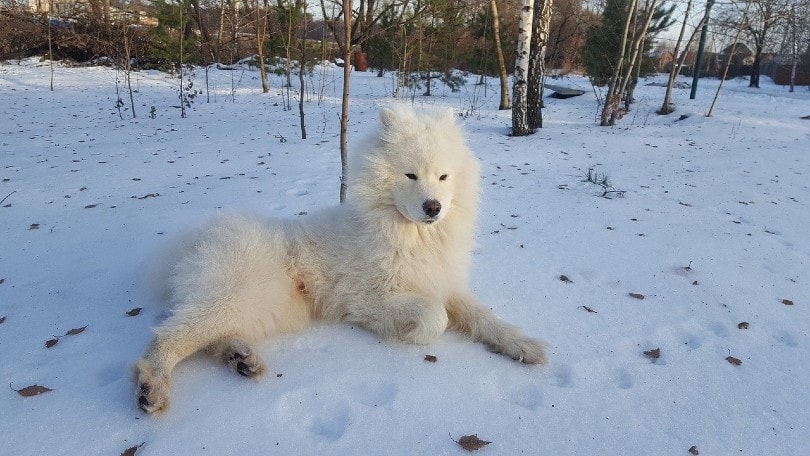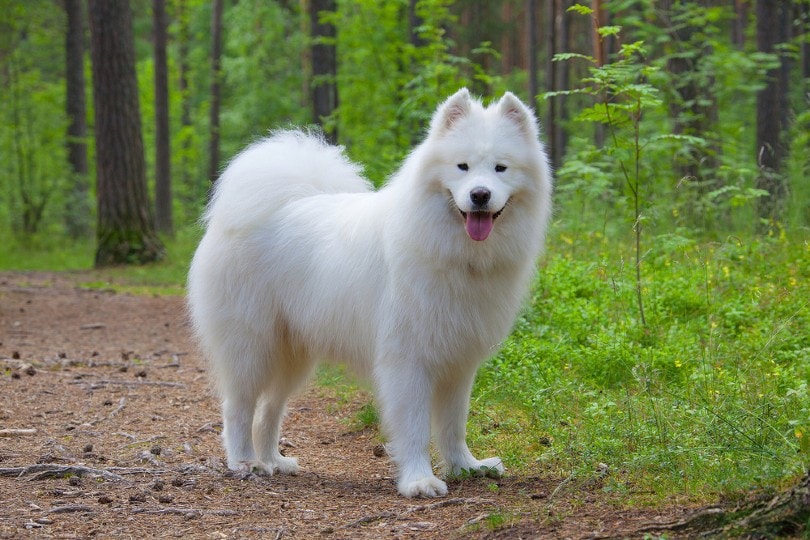
Click Below to Skip Ahead
Samoyed dogs have an adventurous history that dates back 1,000 years. A nomadic group from Asia, the Samoyedic people, depended on the dogs for hunting, herding, and keeping them warm at night in Siberia. In 1906, the American Kennel Club (AKC) recognized the Samoyed as a registered breed, and soon American pet owners fell in love with the smiling canine. Samoyeds are highly intelligent animals that require substantial exercise and attention from their owners. They have working dog DNA, but they’re incredibly loving and loyal.
Breed Overview
Height:
19 – 23.5 inches
Weight:
35 – 65 pounds
Lifespan:
12 – 14 years
Colors:
White, cream, light brown
Suitable for:
Families, active singles, farmers, sled dog crews
Temperament:
Energetic, intelligent, mischievous, loving
The dogs thrive in frigid environments, and they’re well suited to work on sled dog teams. First-time dog owners may struggle to train and handle Samoyeds, but pet parents who commit to professional obedience training early in their dogs’ lives will have a much easier time controlling the spirited canines.
Although their thick, double coat protects them in subfreezing temperatures, they adapt well to moderate climates. Samoyedic people slept in tents in the harsh Siberian landscape, and they snuggled up to their dogs for warmth. A close bond was formed between the owners and dogs, and that endearing relationship continues today with Samoyeds and their human caretakers.
Samoyed Characteristics
 Samoyed Puppies
Samoyed Puppies
Samoyeds are considered an expensive breed. Dogs with champion bloodlines are significantly more costly, and they’re more expensive in the Northeast than they are in the Midwest or western states. Before adopting a puppy from a breeder, try to schedule a tour of the facilities so that you can meet the parents and ensure sanitary procedures are followed. Samoyeds are healthy animals, but they should be tested for hip dysplasia before being adopted. Dysplasia is a medical condition that affects many large breeds of dogs and cats, and it can be especially hard on active breeds like the Samoyed.
Instead of searching for Samoyed breeders, you can visit local shelters and rescue organizations to adopt a puppy. An adopted adult Samoyed will require adequate training to ensure the dog warms up to its new home and owners. Although they’re not aggressive, they can be stubborn if they do not believe the owner is the alpha animal. Adults will take longer to train, but the experience of owning a Samoyed is worth the wait.
Temperament & Intelligence of the Samoyed
Are These Dogs Good for Families? 👪
Samoyeds adapt well to family life as long as the animals receive plenty of attention and exercise. Families who frequently travel should consider choosing another breed as a pet. Samoyeds are not comfortable spending long hours alone, and they can become anxious and destructive if they’re kept from their families for several days or more. Extended isolation can cause some dogs to pull out tufts of their beautiful fur.
Active families and singles, who enjoy outdoor activities like hiking, running, or sledding, make the best pet parents for Samoyeds. The dogs have a strong drive to work and please their owners, and without frequent exercise and games that challenge their minds, they become restless and unhappy. Although they’re full of energy, they’re also affectionate pets that love to curl up beside their owners on a lazy afternoon. They can live in small apartments if they have access to a yard or nearby dog park.
Owners living in warmer climates benefit from having large backyards with an area reserved for digging. Samoyeds are skilled diggers that enjoy creating deep craters to escape the heat. If the dog is not neutered or spayed, you’re likely to have problems with it digging under a fence. Microchipping your pet is helpful for any breed of dog or cat, but it’s vital for Samoyeds. They can dig and run so fast that they can escape the property in a few minutes.
Samoyeds are excellent pets for older children, but they’re too energetic to be left alone with young kids or infants. They’re strong animals capable of pulling metal sleds, and they can easily knock over a small child while trying to initiate a harmless game. They also have a tendency to nudge other pets or kids with their noses as if they’re herding them into a pasture.
Does This Breed Get Along with Other Pets?
When they’re trained as puppies and introduced to other dogs or cats at an early age, Samoyeds get along well with other animals. Providing an energetic friend for your Samoyed is recommended for pet parents who have limited time to play games with the dog. However, an untrained puppy will act more aggressively to other animals. Samoyeds are instinctually inclined to hunt or herd other animals. They need professional training and a committed owner willing to continuously work with the animal and supervise it around other pets to prevent a conflict.
Things to Know When Owning a Samoyed:
Food & Diet Requirements 🦴
Unless they have food allergies or medical conditions, Samoyeds do not require a specialized diet. Due to their hyper nature, they burn through calories fast and need a diet high in protein and low in carbohydrates. Three to four cups of food and plenty of fresh water are all they need in their daily diet. Without enough exercise, they can become overweight and more vulnerable to joint problems.
Exercise 🐕
A morning and evening walk and an at least an hour of playtime at home should be enough exercise to fulfill the dog’s fitness requirements. With its thick, fluffy coat, the Samoyed is not tolerant of hot weather, and it’s best to avoid walking the animal during the hottest time of day in the summer months. Another pet friend can keep a Samoyed entertained at home, but the dog does not enjoy solo games. It loves participating in family activities and feels right at home when it engages in winter sports.

Training 🎾
Although they’re smart, Samoyeds require firm instructors who maintain order during training. The dog can be stubborn during exercises when it tries to exert dominance over the trainer, but it should never be struck or screamed at when it misbehaves. Negative reinforcement can weaken the bond between the owner and dog and lead to aggression and anxiety.
Mistreated Samoyeds are also more likely to have problems with excessive barking. They’re vocal dogs, but they can be trained to limit their outbursts and reserve barking fits for emergencies. Some owners are hesitant to spend money on training after purchasing an expensive pet, but the benefits of professional assistance outweigh the costs.
Grooming ✂️
A Samoyed has a dense coat composed of a silky undercoat and a thick, fluffy topcoat. Daily brushing is crucial to keeping the animal’s fur clean and healthy, and you’ll need a standard slicker brush and dematter to remove tangles and matted hair. As long as you keep the hair clean, you do not have to bathe the pup frequently. It sheds more in warmer environments, but the dog typically goes through heavy shedding cycles at least twice a year.
Weekly tooth brushing can prevent infections and tooth decay, but be sure to check with a veterinarian for the correct method and tools to make the routine less stressful for the dog. Inspecting and cleaning the canine’s ears at least once a week and clipping its nails when they grow long are also beneficial to the animal’s health and well-being. If you’re unable to maintain a grooming routine, you can contact a professional groomer for year-round care. However, grooming expenses can add up quickly when you own a Samoyed, and it’s more cost-effective to groom the dog yourself.

Health and Conditions🏥
If you feed your Samoyed a healthy diet and provide ample exercise and love, the dog can live up to 14 years. It’s a healthy species, but it’s susceptible to a few health conditions that you should take into consideration.
Male vs Female
Males are a few inches taller than females, and they’re more muscular, but both sexes are energetic and affectionate. If you have multiple pets and young children, a male behaves better in that environment. Female Samoyeds are more independent and may act timid around kids, and they’re not as sociable with other animals as males.
Male dogs bond closer to one owner than female dogs, but females are easier to train and less likely to be distracted during a training session. Although they’re loving, females are less likely to become lapdogs than males.
3 Little-Known Facts About the Samoyed
1. The Samoyed’s Smile Is an Evolutionary Advantage
The slight curve in a Samoyed’s jawline makes the dog appear like it’s smiling, but it also serves a vital purpose in an arctic environment. The shape of the animal’s mouth prevents icicles from forming on its lower jaw.
2. Samoyed Ancestors Were Skilled Reindeer Hunters
Samoyedic tribes initially used the dogs to hunt reindeer, but in later years, the reindeer were confined to fenced-in enclosures. Samoyeds adapted to the new reindeer farming methods by becoming herders rather than hunters. Today’s Samoyeds still retain the enhanced prey drive and herding skills.
3. Arctic Explorers Introduced Samoyeds to Great Britain in the late 18th Century
Queen Alexandria was impressed with the gorgeous white dogs, and she helped promote the breed to British citizens.

Final Thoughts
Descended from the wild hunters in the Siberian wilderness, the Samoyed is a spectacular creature capable of pulling a sled, herding livestock, or enjoying the company of its family. The furry white dogs are happiest when they’re exercising next to their owners, and they require a considerable number of activities to keep them fit and emotionally balanced. Although they’re close relatives of wolves, they bond closely to humans and suffer from anxiety when they’re left alone for long periods. If you’re looking for a high-energy pet that’s loyal and loving, the Samoyed is the breed for you.
Next on your reading list:
Featured Image Credit: Evgeniia Shikhaleeva, Shutterstock

 Samoyed Puppies
Samoyed Puppies





